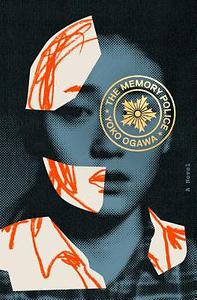Take a photo of a barcode or cover
Quite a frustrating read for me. Threads of the novel are first class, but the whole is marred by a curious loyalty to state-control dystopia tropes. When these dystopias work, they work because they spring from a stifling inevitability brought about by a circumstance such as environmental collapse, exponential technological progress, or biological error, which is often exploited by a power seeking control. This power becomes the antagonist which our main character attempts to defy. So far so good, but that power must have a consistent rationale. This is where The Memory Police goes off the rails.
Ogawa delivers a standard nazi-like state, complete with impressive uniforms, stomping boots, house searches, declarations, abductions, etc, but offers no reasoning for their project. Ostensibly, they are weeding out those with intact memories. Why? Nope. They are enforcing disappearances. Why? Nope. They are destroying the disappeared things. Why? Nope. The people lose use for them anyway.
The MPs provide a plot driver, but a frustratingly unnecessary one. Ogawa's main concerns with the novel (as with Prof/Housekeeper) are explorations of memory and identity, in this case the decay of. These are handled with a restrained spare prose capable of incredible clarity and power; the kind of writing that has fans devouring her books all over the world. The disintegration of the main character, her battle with her art, her wonderfully revealing manuscript, even the collective losses of the island's people, are a fantastically creative and satisfying project to read, independent of the MPs. Her inner challenges (and those of her fellow islanders) due to the strange disappearances which lead to complete destruction are enough for a superb tale, and I'm sure Ogawa would have delivered a stunning original dystopia without the need of a police at all.
Ogawa delivers a standard nazi-like state, complete with impressive uniforms, stomping boots, house searches, declarations, abductions, etc, but offers no reasoning for their project. Ostensibly, they are weeding out those with intact memories. Why? Nope. They are enforcing disappearances. Why? Nope. They are destroying the disappeared things. Why? Nope. The people lose use for them anyway.
The MPs provide a plot driver, but a frustratingly unnecessary one. Ogawa's main concerns with the novel (as with Prof/Housekeeper) are explorations of memory and identity, in this case the decay of. These are handled with a restrained spare prose capable of incredible clarity and power; the kind of writing that has fans devouring her books all over the world. The disintegration of the main character, her battle with her art, her wonderfully revealing manuscript, even the collective losses of the island's people, are a fantastically creative and satisfying project to read, independent of the MPs. Her inner challenges (and those of her fellow islanders) due to the strange disappearances which lead to complete destruction are enough for a superb tale, and I'm sure Ogawa would have delivered a stunning original dystopia without the need of a police at all.
dark
mysterious
reflective
tense
medium-paced
Plot or Character Driven:
A mix
Strong character development:
Yes
Loveable characters:
Yes
Diverse cast of characters:
Yes
Flaws of characters a main focus:
Complicated
dark
reflective
Plot or Character Driven:
A mix
Loveable characters:
Complicated
Flaws of characters a main focus:
No
Fascinating book. It’s reminiscent of 1984, but I think I like it better. It’s going to frustrate people because it doesn’t provide a lot of answers, nor does it inspire hope, but there’s plenty of meaning to take away. I love how quiet, arcane, and unassertive The Memory Police is.
If you’re a fan of a little ambiguity and abstraction, then you might like this.
If you’re a fan of a little ambiguity and abstraction, then you might like this.
It is a very melancholy book. Yes, it is in conversation with 1984, but chooses a more sombre and personal sort of resistance and capitulation.
dark
emotional
reflective
sad
slow-paced
Plot or Character Driven:
A mix
Strong character development:
Complicated
Loveable characters:
Complicated
Diverse cast of characters:
No
Flaws of characters a main focus:
Complicated
A slow plot that is very layered and deals with complex topics
dark
sad
tense
medium-paced
Plot or Character Driven:
Plot
Strong character development:
No
Loveable characters:
Complicated
Diverse cast of characters:
Complicated
Flaws of characters a main focus:
No
emotional
mysterious
reflective
sad
fast-paced
Plot or Character Driven:
Character
Strong character development:
Complicated
Loveable characters:
Yes
Diverse cast of characters:
Yes
Flaws of characters a main focus:
No
It feels dreamy despite the very grounded language used? Others describe it as Kafka-esque, and I guess I see why. The book's overall theme is quite tragic, but the book proceeds beautifully ; more curious moments than intense moments, and there's quite a stark contrast between the narrator's recounted beautiful moments (or memories, as you can call them) and the dystopian context of the island. The narrator's daily life is composed of beautiful moments up until an inevitable, tragic end, and she watches each fleeting moment with more passing melancholy than outright anger. Almost like she's trying to forget what haunts her in the first place.
There's one thing in the book that stuck with me. Memories don't just ground us in the past. Maybe we forget all the details and the perception of it during its time, but what it leaves behind is, as R says, a sprout waiting to grow back, and our perception of memories constantly changes as time proceeds forward. There's timeless beauty to everything from the past, almost as if our entire existence depends on it, and when we forget the memory, we might very well forget the beauty of things we once cherished. We lose a part of ourselves. This also reminds me of a discussion we had in a philosophy class about personal identity. If our memories are lost, is our identity lost? Are we just an empty vessel that drifts around aimlessly? What makes us us? What makes this novel interesting is that the dystopia in which the author is set never provides an overarching answer to why the police do what they do. Banning fruits, body parts, boats, books - all of these actions seem very arbitrary. There's no transparent end goal - only the residents are left suffering in the end, taking personal losses from a fate that they have no control over. They're left grappling with a self-annihilation that forces them to try to recount what's truly core to them, what truly matters to them. Even as objects are lost, we see people always finding limits. When one thing core to them is forced to fade, they find themselves unable to adapt to a world without it because a world without these precious memories is to them a fate no different from death.
It's prescient, too. We live in an age where constant novelty from new technology makes us discard things at an equally fast rate. There are many stories in memories that are left untold, moments that stay alive until they are forgotten. And to hide it isn't just hiding truths themselves, but confining us to a constant cycle of death, where we inevitably feel emptier.
There's one thing in the book that stuck with me. Memories don't just ground us in the past. Maybe we forget all the details and the perception of it during its time, but what it leaves behind is, as R says, a sprout waiting to grow back, and our perception of memories constantly changes as time proceeds forward. There's timeless beauty to everything from the past, almost as if our entire existence depends on it, and when we forget the memory, we might very well forget the beauty of things we once cherished. We lose a part of ourselves. This also reminds me of a discussion we had in a philosophy class about personal identity. If our memories are lost, is our identity lost? Are we just an empty vessel that drifts around aimlessly? What makes us us? What makes this novel interesting is that the dystopia in which the author is set never provides an overarching answer to why the police do what they do. Banning fruits, body parts, boats, books - all of these actions seem very arbitrary. There's no transparent end goal - only the residents are left suffering in the end, taking personal losses from a fate that they have no control over. They're left grappling with a self-annihilation that forces them to try to recount what's truly core to them, what truly matters to them. Even as objects are lost, we see people always finding limits. When one thing core to them is forced to fade, they find themselves unable to adapt to a world without it because a world without these precious memories is to them a fate no different from death.
It's prescient, too. We live in an age where constant novelty from new technology makes us discard things at an equally fast rate. There are many stories in memories that are left untold, moments that stay alive until they are forgotten. And to hide it isn't just hiding truths themselves, but confining us to a constant cycle of death, where we inevitably feel emptier.
challenging
emotional
sad
tense
medium-paced
Plot or Character Driven:
Character
Loveable characters:
Yes






